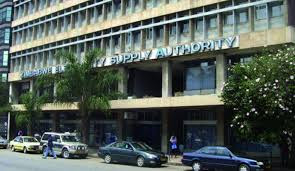 THE debt-ridden Zimbabwe Electricity Supply Authority
(Zesa) has written to government lobbying for a tariff hike with effect from
next month amid reports the national power utility is technically insolvent,
the Zimbabwe Independent has established.
THE debt-ridden Zimbabwe Electricity Supply Authority
(Zesa) has written to government lobbying for a tariff hike with effect from
next month amid reports the national power utility is technically insolvent,
the Zimbabwe Independent has established.
The parastatal, which has sought a tariff increase in the
last few years arguing that it was charging “a lower-than-cost tariff” at a
time it is expected to carry out major infrastructure development projects,
says the 9,86 cents per kilowatt hour (kWh) it has been charging does not allow
it to break even.
Zesa’s efforts to review tariffs from 9,86c kWh to 14,64c
kWh were last year blocked by the government, through the Zimbabwe Energy
Regulatory Authority, saying it should seek ways of reducing its cost structure
while also enhancing its debt collection mechanisms.
This comes on the backdrop of reports that Zesa owes its
local and international suppliers close to US$1 billion and if no intervention
is done Zimbabwe can soon experience massive power shortages. Zesa’s 2016
annual report shows that the parastatal has non-current liabilities totalling
US$130 946 147.
In a document presented to Energy and Power Development
minister Simon Khaya Moyo, seen by the Independent, Zesa management argues that
if no intervention is taken, especially on the proposed tariff increase, the
power situation in the country could further deteriorate.
The document states that: “Zesa is technically insolvent as
its debt has ballooned to US$1 billion. Zesa’s debt to the South African power
utility Eskom has ballooned to US$41 million, while it still owes Hydro Cahora
Bassa of Mozambique about US$9 million. The country consumes about 1 600MW
daily.”
According to the document, state entities owe Zesa US$520
million, while government has managed to pay only US$150 million through
Treasury Bills.
Zesa says government must urgently pay its bills so that it
stays on its feet.
“The disbursement is crucial in the sense that it supports
power supply reliability as the power utility will pay for its imports as well
as coal supplies,” the document reads.
“An immediate solution is that Zesa can be allowed to
increase its tariff to achieve a break even.”
Currently, electricity tariffs stand at 9,86c/kWh and were
last received in 2011.
Zesa wants the tariff be adjusted by 1,5c/kWh by January
2018. The company is also open to have the tariff increase staggered between
January 2018 and May.
A senior Zesa official told the Independent this week that
the parastatal was waiting for a response from the minister.
The ministerial brief states that Zesa has legacy debts,
outstanding liabilities and payroll costs in excess of US$40 million.
“These are loans that were used to finance projects in the
power sector from multilateral and European bans and the debts are all due,”
the document says.
“Zesa is not creditworthy and it is now failing to fund its
capital projects and that the biggest problem is that critical long-term
projects have deliberately been financed inappropriately using short-term
money.”
In an interview last week, Zesa group chief executive
officer Josh Chifamba said urgent measures are required to curb power supply
threats.
“I have already engaged the Reserve Bank of Zimbabwe
governor John Mangudya so that forex is availed to make sure that we pay for
our imports,” Chifamba said.
“The nation should not panic because we have put in place
short-term measure so that power supply is not interrupted.” Zimbabwe
Independent








0 comments:
Post a Comment